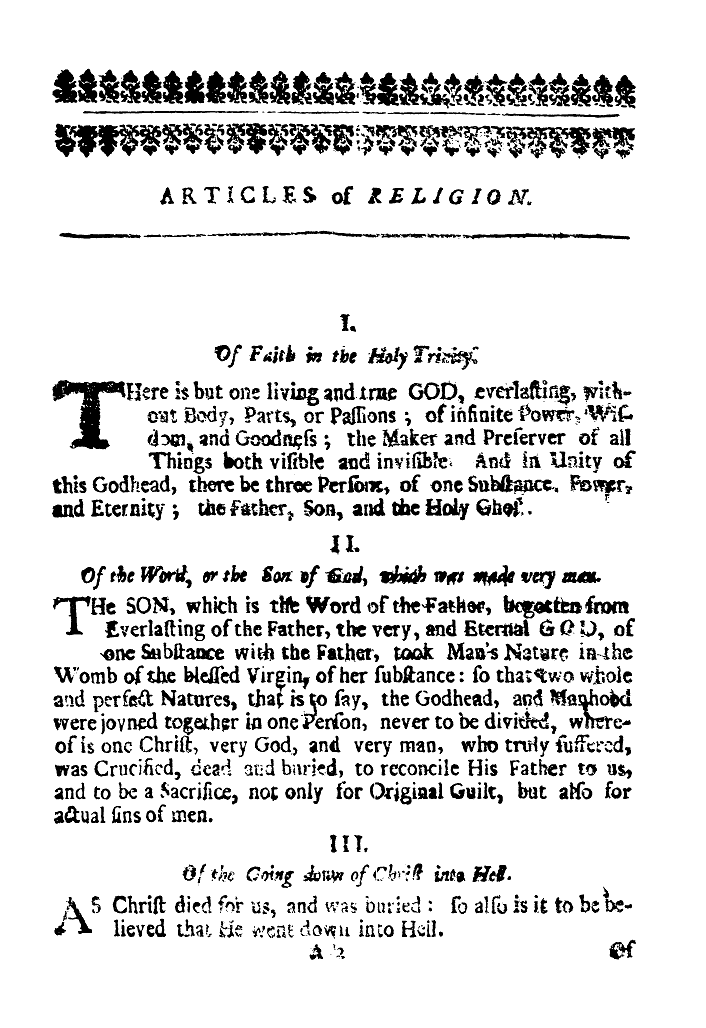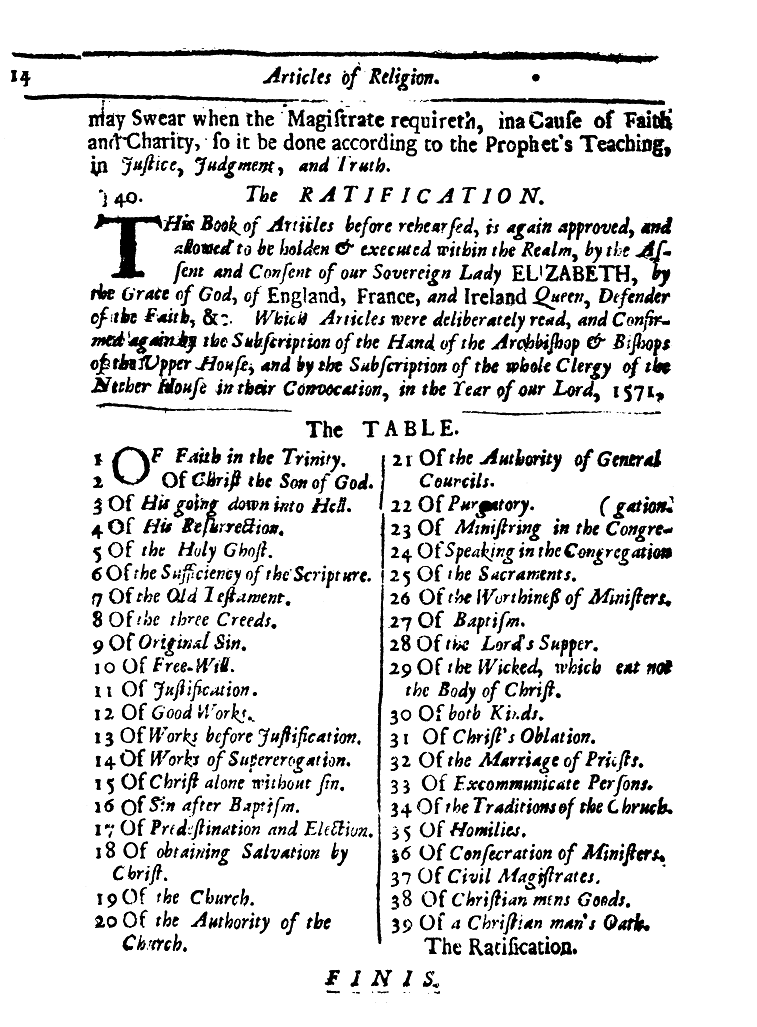Articles agreed upon… for the avoiding of Diversities of Opinions.
— From the Title.
Whosoever shall affirm that any of the nine and thirty articles are in any part superstitious or erroneous, or such as he may not with a good conscience subscribe unto; let him be excommunicated ipso facto.
— Canon V, 1604.
No man shall put his own sense or Comment to the meaning of the Article, but shall take it in the literal and Grammatical sense.
— Preface, 1628.

Articles of Religion.
I.
Of Faith in the Holy Trinity.
II.
Of the Word, or the Son of God, which was made very man.
III.
Of the Going down of Christ into Hell.
IV.
Of the Resurrection of Christ.
V.
Of the Holy Ghost.
VI.
Of the Sufficiency of the Holy Scriptures for Salvation.
HOly Scripture containeth all things necessary to Salvation; so that whatsoever is not read therein, nor may be proved thereby, is not to be required of any man, that it should be believed as an Article of the Faith, or be thought requisite or necessary to Salvation. In the name of the Holy Scripture, we do understand those Canonical Books of the Old and New Testament, of whose Authority was never any doubt in the Church.
¶ Of the Names and Number of the Canonical Books.
Exodus,
Leviticus,
Numbers,
Deuteronomy,
Joshua,
Judges,
Ruth,
The 1. Book of Samuel,
The 2. Book of Samuel,
The 1. Book of Kings,
The 2. Book of Kings,
The 2. Book of Chronicles,
The 1. Book of Esdras,
The 2. Book of Esdras,
The Book of Esther,
The Book of Job,
The Psalms,
The Proverbs,
Ecclesiastes or Preacher,
Cantica, or Songs of Solomon,
4 Prophets the greater,
12 Prophets the less,
And the other Books (as Hierome saith) the Church doth read for example of life and instruction of manners; but yet doth it not apply them to establish any Doctrine: such are these following,
The 4. Book of Esdras,
The Book of Tobias,
The Book of Judith,
The rest of the B. of Esther,
The Book of Wisdom,
Jesus the son of Syrach,
The Song of the 3 Childr.,
The Story of Susanna,
Of Bel and the Dragon,
The Prayer of Manasses,
The 1. Book of Maccabees,
The 2. Book of Maccabees.
VII.
Of the Old Testament.
VIII.
Of the Three Creeds.
IX.
Of original Birth or Sin.
X.
Of Free-Will.
XI.
Of the Justification of man.
XII.
Of Good Works.
XIII.
Of Works before Justification.
XIV.
Of Works of Supererogation.
XV.
Of Christ alone without Sin.
XVI.
Of Sin after Baptism.
XVII.
Of Predestination and Election.
PRedestination to Life, is the everlasting purpose of God, whereby (before the Foundations of the world were laid) He hath constantly Decreed by His Counsel, secret to us, to deliver from Curse and Damnation, those whom He hath chosen in Christ out of Mankind, and to bring them by Christ to everlasting Salvation, as vessels made to Honour. Wherefore they which be endued with so excellent a Benefit of God, be called according to God’s purpose by His Spirit working in due season: they through Grace obey the Calling: they be justified freely: they be made sons of God by Adoption: they be made like the Image of His only begotten Son Jesus Christ: they walk religiously in Good Works, and at length by God‘s Mercy they attain to everlasting Felicity.
As the godly Consideration of predestination, and our Election in Christ, is full of sweet, pleasant, and unspeakable Comfort to godly persons, and such as feel in themselves the working of the Spirit of Christ, mortifying the works of the Flesh, and their earthly Members, and drawing up their mind to high and heavenly things, as well because it doth greatly establish & confirm their Faith of eternal Salvation, to be enjoyed through Christ, as because it doth frequently kindle their Love towards God: So, for curious and carnal persons, lacking the Spirit of Christ, to have continually before their eyes the sentence of God’s Predestination, is a most dangerous down-fall, whereby the devil doth thrust them either into desperation, or into wretchlessness of unclean Living, no less perilous than Desperation.
XVIII.
Of obtaining eternal Salvation only by the name of Christ.
XIX.
Of the Church.
THe visible Church of Christ is a Congregation of Faithful men, in the which the pure Word of God is preached, and the Sacraments be duly Ministered, according to Christ’s Ordinance in all those things that of necessity are requisite to the same.
XX.
Of the Authority of the Church.
XXI.
Of the Authority of General Councils.
XXII.
Of Purgatory.
XXIII.
Of Ministering in the Congregation.
XXIV.
Of Speaking in the Congregation in such a Tongue as the People understandeth.
XXV.
Of the Sacraments.
SAcraments ordained of Christ, be not only Badges or tokens of Christian men’s Profession; but rather they be certain sure Witnesses, and effectual Signs of Grace, and God’s Good Will towards us, by the which He doth work invisibly in us, and doth not only quicken but also strengthen and confirm our Faith in Him.
There are two Sacraments ordained of Christ our Lord in the Gospel, that is to say, Baptism, and the Supper of the Lord.
Those five commonly called Sacraments, that is to say, Confirmation, Penance, Orders, Matrimony, and Extreme Unction, are not to be counted for Sacraments of the Gospel, being such as have grown, partly of the corrupt following of the Apostles, partly are states of life allowed by the Scriptures: but yet have not like nature of Sacraments, with Baptism and the Lord’s Supper, for that they have not any visible Sign or Ceremony ordained of God.
XXVI.
Of the unworthiness of the Ministers which hinders not the Effects of the Sacraments.
ALthough in the visible Church the evil be ever mingled with the good, and sometime the evil have chief Authority in the Ministration of the Word and Sacraments; yet forasmuch as they do not the same in their own Name, but in Christ’s, and do minister by His Commission and Authority, we may use their Ministry, both in hearing the Word of God, and in receiving of the Sacraments. Neither is the Effect of Christ’s Ordinance taken away by their wickedness, nor the grace of God’s Gifts diminished from such, as by Faith, and rightly do Receive the Sacraments ministered unto them, which be effectual, because of Christ’s Institution & Promise, although they be ministered by evil men.
XXVII.
Of Baptism.
XXVIII.
Of the Lord’s Supper.
THe Supper of the Lord is not only a sign of the Love that Christians ought to have among themselves one to another: but rather it is a Sacrament of our Redemption by Christ’s Death: insomuch that to such as rightly, worthily, and with Faith receive the same, the Bread which we break, is a partaking of the Body of Christ; and likewise the Cup of Blessing is a partaking of the Blood of Christ.
Transubstantiation (or the Change of the Substance of Bread and Wine) in the Supper of the Lord, cannot be proved by Holy Writ: but it is repugnant to the plain words of Scripture, overthroweth the Nature of a Sacrament, and hath given occasion to many Superstitions.
The Body of Christ is given, taken, and eaten in the Supper only after an heavenly & spiritual manner. And the mean whereby the Body of Christ is received and eaten in the Lords Supper is Faith.
XXIX.
Of the wicked, which eat not the Body of Christ in the use of the Lord’s Supper.
XXX.
Of both kinds.
XXXI.
Of the one Oblation of Christ, finished upon the Cross.
XXXII.
Of the Marriage of Priests.
XXXIII.
Of Excommunicate Persons, how they are to be avoided.
XXXIV.
Of the Traditions of the Church.
IT is not necessary that Traditions and Ceremonies be in all places one, or utterly like; for at all times they have been divers, and may be changed according to the Diversity of Countries, times, & men’s Manners, so that nothing be ordained against God’s Word. Whosoever through his private Judgment, willingly, & purposely doth openly break the Traditions and Ceremonies of the Church which be not repugnant to the Word of God, and be Ordained and Approved by common Authority, ought to be rebuked openly, (that others may fear to do the like) as he that offendeth against the Common Order of the Church, and hurteth the Authority of the Magistrate, and woundeth the Consciences of the weak Brethren.
XXXV.
Of Homilies.
THe 2nd Book of Homilies, the several Titles whereof we have joined under this Article, doth contain a godly & wholesome Doctrine, and necessary for these times, as doth the former Book of Homilies, which were set forth in the time of Edward the 6th; and therefore we judge them to be read in Churches by the Ministers, diligently & distinctly that they may be understood of the People.
¶ Of the Names of the Homilies.
XXXVI.
Of Consecration of Bishops and Ministers.
XXXVII.
Of the Civil Magistrates.
THe Queen’s Majesty hath the chief Power in this Realm of England, and other Her Dominions, unto whom the chief Government of all Estates of this Realm, whether they be Ecclesiastical or Civil, in all Causes doth appertain, and is not, nor ought to be subject to any foreign Jurisdiction.
Where we attribute to the Queen’s Majesty the Chief Government, by which Titles we understand the minds of some slanderous folks to be offended: we give not our Princes the ministering either of God’s Word, or of the Sacraments, the which thing the Injunctions also lately set forth by Elizabeth our Queen, do most plainly testify: but that only Prerogative, which we see to have been given always to all godly Princes in holy Scriptures by God Himself, that is, that they should Rule all Estates & Degrees committed to their Charge by God, whether they be Ecclesiastical or Temporal, and restrain with the Civil Sword the stubborn and evil Doers.
The Bishop of Rome hath no Jurisdiction in this Realm of England.
The Laws of this Realm may punish Christian men with death, for hainous and grievous Offences.
XXXVIII.
Of Christian men’s Goods which are not Common.
XXXIX.
Of A Christian man’s Oath.
The Ratification.
THis Book of Articles before rehearsed, is again approved, and allowed to be holden & executed within the Realm, by the Assent and Consent of our Sovereign Lady Elizabeth, by the Grace of God, of England, France, and Ireland Queen, Defender of the Faith, &c. Which Articles were deliberately read, and confirmed again by the Subscription of the Hands of the Archbishop & Bishops of the Upper House, and by the Subscription of the whole Clergy of the Nether House in their Convocation, in the Year of our Lord, 1571.

The Table.
Finis.